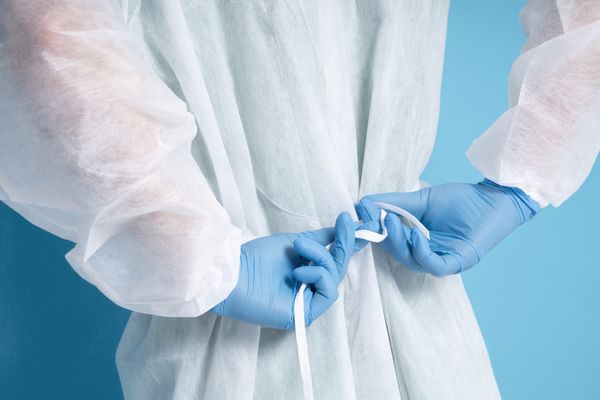
‘I was stunned it made people so angry’
Vicky Featherstone, former artistic director of the Royal Court, on Blasted. In the play, journalist Ian brings the much younger Cate back to his hotel room in Leeds and tries to seduce her. Then a soldier enters brandishing a gun, triggering scenes of rape, violence and cannibalism. Premiered at the Royal Court, London, in 1995.
I first met Sarah when we were both at the Bush theatre. One day she said to me: “Oh my God, I’ve had a play accepted at the Royal Court!” I remember being shocked by the vile response to Blasted. When I went to see it myself, I was stunned that it had made people so angry. When you watch it and understand what she was writing about, you can see that there wasn’t another way the play could be. That’s what’s so extraordinary about Sarah’s writing.

The anger directed at the violence in her work showed a detachment from what we were seeing on the news, the war crimes we were doing nothing about. This is happening now. Famously, though, Sarah always talked about her plays being about love. When Cate comes back to Ian at the end of Blasted, it’s as an act of love. You believe you’re watching one thing – and then it slips, without any tangible logic, into something else.
Sarah used to say, and I think this is still the case, that people don’t know how to write about form in the theatre and that form should defy what we already know, surprising us in some way. Part of the vitriol towards her came from the fact that it was undefinable. She cared deeply about writers and felt such a responsibility to meet them. It’s one of the great tragedies that she will have no idea – and would have felt so thrilled by the fact – that her writing has influenced and affected people and that we’re still having conversations about it 25 years after her death.

‘Sometimes people laugh at the violence at the end’
Stefanie Reinsperger, of the Berliner Ensemble, on Phaedra’s Love which she currently stars in. The play, a radical take on Seneca’s Phaedra, is about the destructive relationship between Queen Phaedra and her sex-addicted stepson, Hippolytus. Premiered at the Gate theatre, London, 1996.
We stage Phaedra’s Love as a monologue and loop the rape scene. I play all the roles: first you see the perspective of Hippolytus, then Phaedra’s. I always like to use my body as an instrument, especially with Sarah ’s work. You need to discuss how to show the rape, how to make it as truthful as possible. So that was really challenging, finding a way to do that with just myself.
Sometimes people start laughing at the violence at the end, because it’s so absurd. Everyone in the audience is scared of me, because I like to interact with them. The first section is really physical and loud. Robert Borgmann, my director, said you have to imagine you’re jumping with your naked ass into the audience – it needs to be brutal. But after those first 20 minutes, then you just have the text, and the text is so beautiful and hard. What she’s doing is so intelligent, with all these ups and downs. That’s really rare.
I think about Sarah’s life a lot. It seems like there’s a revival of interest in her work because she was this female author writing about violence and love. I mean, look at our society right now. Those topics will never go away.

‘We were booed once. It felt like quite an achievement’
Daniel Evans on Cleansed, in which rape, suicide and torture are juxtaposed with moments of tenderness in a university-type institution. One character has their tongue cut out and feet cut off. Evans starred in the premiere at the Royal Court in 1998.
I devoured Cleansed when I first read it. After Blasted, there was an expectation and Sarah exceeded it – because Cleansed dares to go to places of deep, existential pain in order to talk about love. She was able to say so much with so few words. We rehearsed in a very cold room, which for a play with lots of nudity wasn’t great. We kept having to bring in heaters. I remember Sarah arriving one day and saying she wanted to make a change. It was to turn a comma into a full-stop. I remember thinking: “Is that it?” But then I realised it totally changed the meaning.
We were booed once, which wasn’t very pleasant. But we’re in England, after all, where people don’t tend to boo very often, so it felt like quite an achievement. It was a very physical production. I think most of us were naked at one point or another.
James Macdonald was the director and Jeremy Herbert designed some of the scenes to make it seem as if the audience had a bird’s eye view. Suzan Sylvester had to do this dance, which involved being in a harness, and she did her back in during the last week of the run. It was a huge shock, but obviously hugely exciting when Sarah said she’d do the role. She was so calm. She had to learn a dance, be naked, do the flying. But at least she already knew all the lines. It felt like she was giving her utter truth, unadorned. There was no sense of her having developed any habits, as actors do over time. Her performance encouraged us to emulate that.

‘You can set it anywhere and cast anyone’
Tinuke Craig on Crave, a revival of which she directed in 2020. A non-linear, poetic work with dialogue, the play encompasses rape, incest, drug addiction, murder and suicide, but also beauty and love. Premiered at the Traverse, Edinburgh, in 1998.
I read Crave when I was at university. Actually, I read all of Sarah’s plays in one night while listening to Antony and the Johnsons. I remember Crave’s extraordinary monologue about what obsessive, destructive love feels like – how exhausting it made love sound.
The play offers its director a huge amount of freedom as well as a huge amount of structure. The characters have letters for names – A, M, C and B – and it’s up for grabs as to what those letters mean. You can set it anywhere and cast anyone. The possibilities are endless. It gives you this huge scope and you have to really ask yourself what you think is happening. On the other hand, there’s a rhythm that’s inescapable – musical, syncopated and specific. That rhythm dictates what it ought to feel like. As for what it’s trying to achieve, the clues are in the form. You just have to choose any one of a million ways to get there.
Crave is about despair and not knowing but it’s also an incredibly knowing piece. It’s full of winks and nods and understands the cruel irony of life. For us, it was about creating a space that plumbed the depths of our secret thoughts: the parts of ourselves that are needy, desperate and shameful. It’s really exposing.

‘I was scared to identify with it’
Vinay Patel, playwright and screenwriter, on 4.48 Psychosis, Kane’s final work composed of 24 sections that have no specified setting, characters or stage directions. The title refers to the time in the early hours of the morning when despair and clarity coalesce. Premiered at the Royal Court in 2000, one year after Kane’s death.
When I first read this, the way Sarah was talking about depression and medicalised despair felt very far away from me, partly because there’s a thing in south Asian communities of not really talking about depression. I used to think that the way you deal with the feelings she was trying to express was not just to leave people with this sense of misery, but to write stuff that leads them out of it.
Rereading the play, what strikes me is how it gets at the idea that you’re always searching for a consistent version of yourself – and you’re doomed never to find it. There’s something about the stillness of the morning that lets you have that sort of sanity and clarity, because the world is quiet. Your thoughts can be slightly more lucid. I realise now that I was scared to identify with that stuff.
The last line of the play is “please open the curtains” and there is a yearning to be beyond that despair. Kane is reacting to a time where everything seemed solid and safe, so the idea of shaking people out of their despair felt important. But now, despair is one click away. It’s really constant. How does that affect the way you react to a work like this?
• In the UK and Ireland, Samaritans can be contacted on freephone 116 123, or email jo@samaritans.org or jo@samaritans.ie. Youth suicide charity Papyrus can be contacted on 0800 068 4141 or email pat@papyrus-uk.org. In the US, you can call or text the National Suicide Prevention Lifeline on 988, chat on 988lifeline.org, or text HOME to 741741 to connect with a crisis counselor. In Australia, the crisis support service Lifeline is 13 11 14. Other international helplines can be found at befrienders.org







